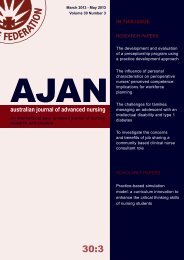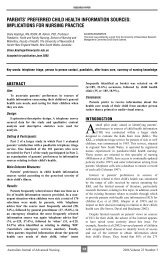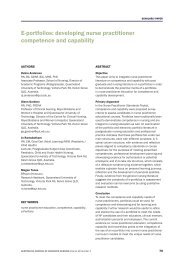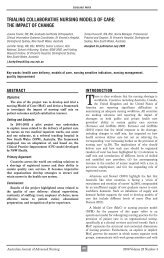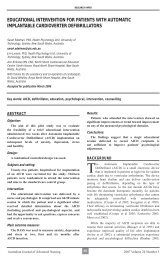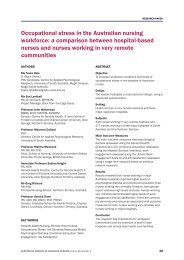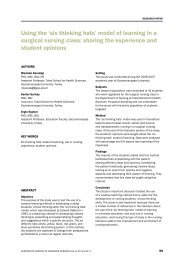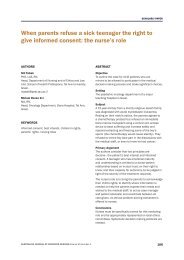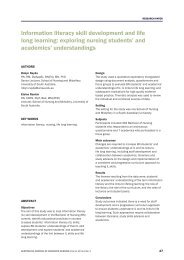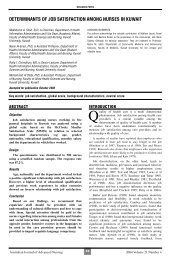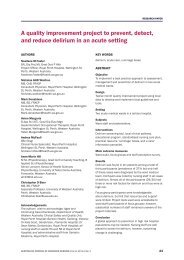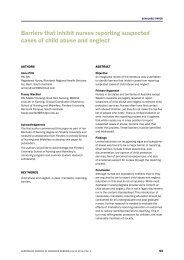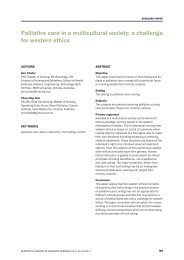australian journal of advanced nursing
australian journal of advanced nursing
australian journal of advanced nursing
Create successful ePaper yourself
Turn your PDF publications into a flip-book with our unique Google optimized e-Paper software.
SCHOLARLY PAPER<br />
Table 3 Perception <strong>of</strong> lifestyle factors (recreational drugs, psychological stress, alcohol, caffeine, diet, exercise,<br />
vitamins) on chance <strong>of</strong> conception<br />
Factor Male (N=10) Female N=10) Why?<br />
Recreational<br />
Drugs<br />
Psychological<br />
stress<br />
Highly influential N=9<br />
Moderately influential N=1<br />
Highly influential N=7<br />
Moderately influential N=3<br />
Alcohol Highly influential N=6<br />
Moderately influential N=3<br />
Slightly influential N=1<br />
Caffeine Highly influential N=5<br />
Moderately influential N=2<br />
Slightly influential N=3<br />
Diet Highly influential N=5<br />
Moderately influential N=4<br />
Slightly influential N=1<br />
Exercise Highly influential N=1<br />
Moderately influential N= 7<br />
Slightly influential N=2<br />
Vitamins Highly influential N=3<br />
Moderately influential N=4<br />
Slightly influential N=3<br />
Eight participants considered caffeine consumption<br />
highly influential and seven thought it would only be<br />
slightly influential to the chance <strong>of</strong> getting pregnant.<br />
Reasons given as to why it could have a negative<br />
effect included: caffeine might alter how the sperm<br />
move and caffeine is dehydrating. Most participants<br />
drank low to moderate amounts <strong>of</strong> one‑two cups <strong>of</strong><br />
c<strong>of</strong>fee, tea or cola per day.<br />
Most couples thought that eating a healthy diet could<br />
improve fertility, because this would promote general<br />
good health. Reasons given included: conception is<br />
a complex event therefore good nutrition must be<br />
beneficial, the body works better when fuelled with<br />
a healthy balanced diet. One couple thought that<br />
an unhealthy diet would only be a problem because<br />
<strong>of</strong> the secondary effect <strong>of</strong> promoting obesity. All<br />
but two participants said they ate a healthy diet,<br />
Highly influential N=8<br />
Moderately influential N=2<br />
Highly influential N=7<br />
Moderately influential N=3<br />
Highly influential N=6<br />
Moderately influential N=2<br />
Slightly influential N=2<br />
Highly influential N=3<br />
Moderately influential N=3<br />
Slightly influential N=4<br />
Highly influential N=4<br />
Moderately influential N=5<br />
Slightly influential N=1<br />
Highly influential N=5<br />
Moderately influential N=5<br />
Highly influential N=4<br />
Moderately influential N=2<br />
Slightly influential N=4<br />
AUSTRALIAN JOURNAL OF ADVANCED NURSING Volume 26 Number 4 81<br />
Toxic<br />
Decreased male sexual performance<br />
Affects general health<br />
Gut feeling<br />
Toxic<br />
Bad for general health<br />
Decreases sexual performance<br />
Only a problem in large quantities<br />
Don’t know<br />
Would need a lot to be a problem<br />
Affects sperm<br />
Dehydrating<br />
Healthy diet is good for general health<br />
which may promote fertility<br />
Secondary effect i.e. bad diet<br />
promotes obesity<br />
Good for general health which may<br />
promote fertility<br />
Endocrine system works more<br />
efficiently<br />
Not necessary if eating a healthy diet<br />
Difficult to eat a healthy diet because<br />
<strong>of</strong> preservatives and additives<br />
No strict regulations associated with<br />
over the counter supplements<br />
although take away food was eaten regularly once<br />
a week by most.<br />
Most couples thought that taking regular exercise<br />
and therefore being physically fit generally promoted<br />
a healthy body, which could improve an individual’s<br />
fertility. However, some couples emphasised that<br />
unfit people frequently become pregnant. Only<br />
one participant (male) thought that the connection<br />
between fitness and fertility was specific, being<br />
related to promoting a better functioning endocrine<br />
system. Most males (nine) considered themselves<br />
to be physically fit and eight exercised on a regular<br />
basis. Most females (seven) also said they were fit<br />
and took regular exercise. Of the participants who<br />
said they were not fit, one exercised regularly and<br />
three took no exercise at all.



